Our Fight to End FGM in The Gambia: Who is Listening?
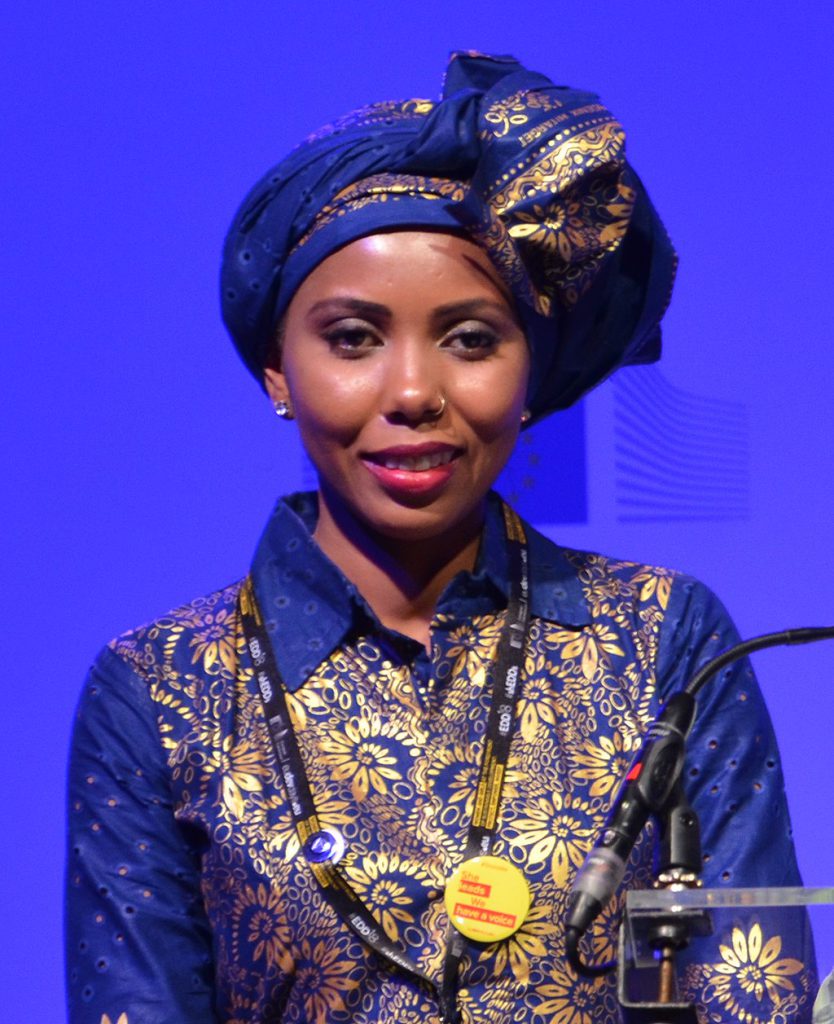
By: Jaha Dukureh, a Gambian anti-female genital mutilation campaigner and the founder and executive director of Safe Hands for Girls. Jaha was named TIME Magazine’s 100 Most Influential People for 2016 and was nominated for the Nobel Peace Prize in 2018. After I spent years campaigning to outlaw female circumcision, finally my country started to listen. In 2015, The Gambia banned Female Genital Mutilation (FGM) and imposed penalties on those who perform or practice it. As a survivor of FGM who played an instrumental role in this fight, I felt ecstatic when I heard the news. But it was a joy that wasn’t to last. If certain politicians have their way, the law will soon disappear and more young children will have to suffer the same pain I did. Some, like my half-sister, may lose their lives. As a survivor of FGM born and raised in The Gambia, a Serahule, and a proud Muslim, my journey has been one of pain, resilience, and unwavering determination. I have learned that it is important to recognize my roots and the challenges that come from speaking up, especially if you are a woman and of my background. Today, as I reflect on the challenges that lie ahead, I am compelled to raise my voice in defense of the progress that has been made in protecting our daughters, our sisters, and future generations of women and girls. I speak up for myself, for my generation, and for the millions of girls who will hear our story and say enough is enough. I will never perform this practice on my daughter. That statement, in itself, is the ultimate victory. And yet sadly, there are still many parents in The Gambia who are fighting for this practice to live on, ignoring our cries for it to end. Still, we refuse to be silenced and stand idly by as our daughters’ bodies are mutilated, their futures stolen, and their dreams shattered. That’s why, as the world celebrated women’s achievements during Women’s History Month in March, we launched a petition to stop the repeal of the ban on FGM in The Gambia. But to be effective – to actually be heard – we need all of you to help tell our parents, “Enough is enough.” Our campaign has given voices to many young girls who continue to unapologetically lead movements to help change social norms. But today, we also need to be honest with ourselves. As much as I am emotionally invested in the campaign, I have always recognized my limitations, especially when I decided to bring my campaign home. If you have the chance to watch Jaha’s Promise, you will understand what I am trying to explain. I was returning home to join a decades-long campaign to end this harmful practice, but it wasn’t easy. As young people, we developed a whole society approach to eradicating the practice. This required us to organize but also to engage with those who had different views than us. Those Gambians for whom FGM is considered a sacred passage that women have to go through. Those fathers, like mine, who gave consent to the practice without understanding what we go through. Like in many parts of Africa, FGM remains a deeply entrenched tradition in The Gambia, affecting a significant portion of the population. According to the United Nations Population Fund, 75 percent of women and girls aged 15-49 have undergone some form of FGM. This practice cuts across ethnic, religious, and cultural boundaries, affecting various communities nationwide. If lawmakers overturn the law now, the numbers will only increase. The proposed repeal is not just a legal issue; it is a moral imperative, a test of our humanity, and a reflection of our values as a society. It sends a dangerous message that the rights and dignity of girls are expendable, that their bodies are mere vessels for the preservation of harmful traditions. But we know better. We know that FGM is a violation of human rights, a form of violence against women and girls, and a practice that should end with us. That’s why we are mobilizing, organizing, and uniting to raise the alarm for the rights of all girls to live free from fear and harm. Our petition is more than just signatures on a page; it is a collective call to our parents to listen to the voice of reason and understand the harm that we go through. As a survivor, I know firsthand the pain and trauma inflicted by FGM. But I also know the power of resilience, the strength of solidarity, and the hope that springs from the darkest of places. Join me – join all of us survivors – as we raise our voices, protect our girls, and say no to the repeal of the ban on FGM in The Gambia. Sign our petition, raise awareness, and stand in solidarity with survivors of FGM. Together, we can protect our girls and build a world where every woman and girl is empowered to live a life of dignity, freedom, and equality. We owe it to our daughters, our sisters, and ourselves to mobilize our communities and demand accountability from our leaders. Our parents aren’t listening to us — our politicians aren’t listening to us — which is why we need your voice, too. With your help, our collective voices will be so loud they’ll be impossible to ignore. #StopFGMRepealGambia #ProtectOurGirls #EndFGM Jaha Dukureh, Founder & CEO of Safe Hands for Girls Council member Nalafem Collective The Gambia Related links: Behind the Wall by Gambian activist and FGC survivor Isatou Jallow UNICEF released new data on global prevalence of FGM/C
Musuya (Womanhood)
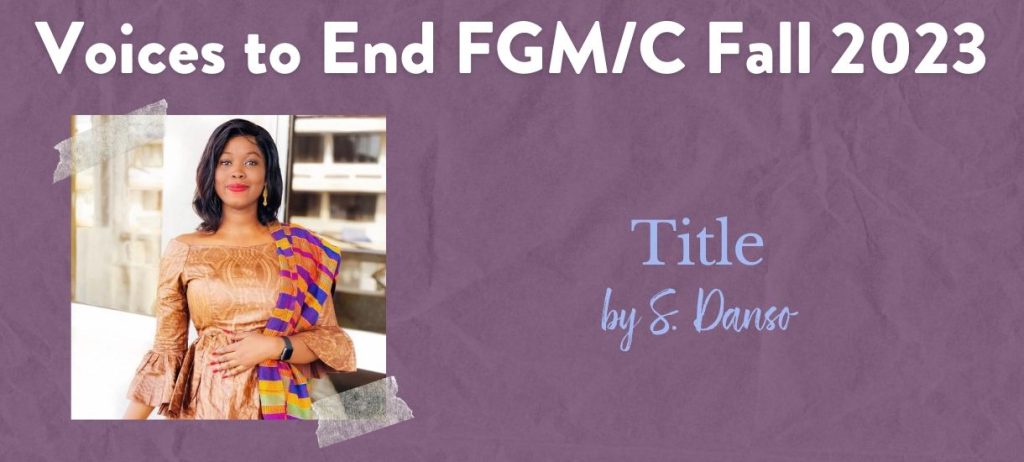
“I believe they don’t really know what it is and how it is conducted, the procedures, and the negative impact that it has… It will be easy to say ‘don’t ban FGM’ when you don’t know what happened in there.” In S Danso’s country, men are working in Parliament to repeal the ban on female genital mutilation (FGM). However, S feels that her story of undergoing FGM and its impact will make those who wish to perform FGM on their loved ones reconsider. She felt it was important to be a part of the growing number of voices raised against FGM, and the Voices to End FGM/C digital storytelling workshop provided an opportunity to do so on an international level. When asked why she wanted to attend the workshop and share her story of FGM, S’s answer was clear: raising awareness. She chose to tell the story of her experience undergoing the cut, with exact details of the ceremony and circumcision that are not well known. “If you are educating people, it is important to get right to the point.” The Voices to End FGM/C workshop was also impactful to S in multiple ways, as she learned from the other participants, who came from different parts of the world. In particular, other survivors talked about how to deal with the “post-FGM whatsoever.” “Things happen and you don’t know how to deal with it,” S explains of her experience as a survivor. However, people at the workshop “explained their healing process” as well as “how to do advocacy work and better convey [a] message to the people.” “Hearing their stories… has motivated me to come up and give out my story. I feel so empowered and confident hearing all of their stories.” S’s workshop experience represents that there is power in numbers, and in creating safe spaces where survivors can come together to share, to heal, and to advocate for change. [youtube url=”https://www.youtube.com/watch?v=iTN6j2JINnE”] S Danso is a Gambian National and a legal practitioner with over eight years of experience in community work and activism focusing on equality, inclusion and social justice. Currently, she is the secretary-general of One African Women’s Forum, an international organization that focuses on promoting women’s rights based in Nigeria. Sirra has impressed all with her warmth, wisdom, and kindness, but above all, her intellectual curiosity and a keen interest in social justice and equality remain exceptional.
It’s a Marathon, Not a Race
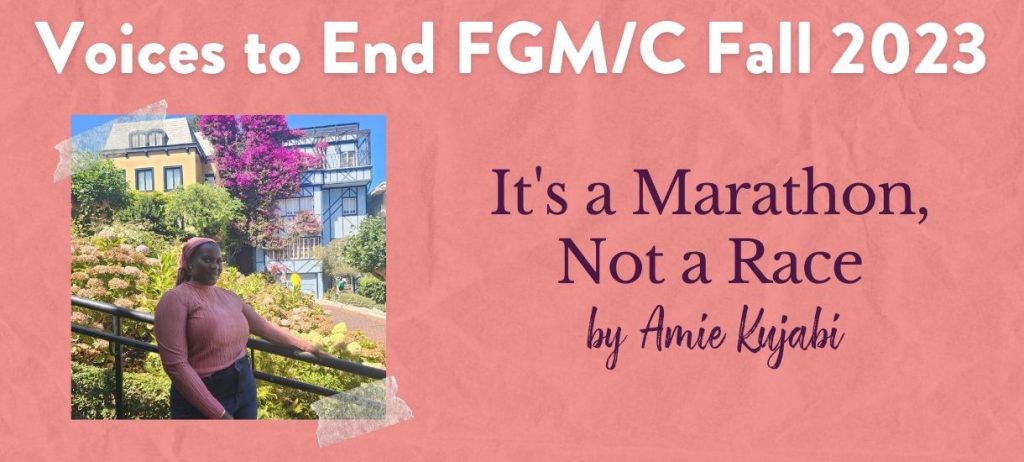
By Amie Kujabi I am an FGM/C survivor. For the past two decades, my advocacy on FGM/C has been centered around other survivors and girls at risk—but never have I shared my story. A story that shaped the trajectory of my childhood and marked the beginning of a long…long…lonely self-awareness journey to an unknown destination. I took a bold step and shared my story as an FGM/C survivor with people outside of my close-knit circle by giving testimony during an anti-FGM/C bill hearing with policymakers in Washington State. It occurred to me that there is a need for survivors to share their unique stories to raise awareness and encourage action-oriented commitments from different stakeholders. When the opportunity to participate in the digital storytelling workshop presented itself, I challenged myself to be part of the amplified voices. Voices that not only narrate similar stories about FGM/C but also give a human face to FGM/C. In our digital world, people are moved not just by words, but also by actions and visual representation. Since FGM/C is not seldom talked about—a taboo in our communities—it was important for my story to be told in a captivating way, to change the narrative. My digital story narrates the experiences I remember the most as a six-year-old girl who was taken to another country (Senegal) for FGM/C, under the disguise of spending summer break with my cousins and family. And so it happened: I was cut and introduced into “womanhood,” as they claimed. I later understood it as “vocational cutting” at the peak of my self-awareness journey as an adult and advocate. My story highlights the issues I faced—and I continue to struggle with. As a survivor, I struggled a lot, with my relationships growing up and in adulthood. Though this experience took me on an unknown journey, it landed me on the shores of “fighting for what is right”. That’s what propelled me into my work as a girl’s and women’s rights advocate. Everything I learned from the workshop was gold to me. I enjoyed all the sessions and the new skills I acquired in creating a digital story. From learning how to write a straight-to-the-point short story, creating and editing a digital story, being in a space with other survivors and allies, sharing our stories, and most importantly, finding support in each other. It made me feel seen and understood in my multifaceted emotions and struggles that the rest of the world may never see on a day-to-day basis. The workshop was an amazing experience, and I want more women (and others ) to be part of this great network. Together we can create more digital stories that amplify voices against this horrendous practice. I want my story to captivate the attention of people from different walks of life. I hope that it will inspire survivors to share their stories, allies to render their support when and where it is needed, and even those on the other side of the table to finally resist this age-old tradition that harms girls. My hope is to see every state and nation have solid anti-FGM/C policies in place. I know for a fact that these laws concentrate on protecting girls at risk of being subjected to FGM/C, but I hope to see the implementation of policies that would support survivors of FGM/C as well. I hope you will find the time to watch my short digital story. A story about a scar. A scar that my primary duty bearers believed was necessary to have in order to be labeled as the “purified” girl, for marriage, as opposed to being referred to as a “solimaa”, the uncut girl. A scar that will resemble a fresh wound for the rest of my life. Here I am today, after being silent for many years. I now am not afraid to talk in public about stopping FGM/C. If there had been laws when I was a child, things would have been different. I was able to convince another family member to have her girls cut. And my mother is finally on board with me. But all I can think is that I failed you. I wish I didn’t have this scar. I wish you didn’t either. But we don’t have to be silent about it. [youtube url=”https://www.youtube.com/watch?v=Kfp7DQXzjlk”] Amie Kujabi was born and raised in The Gambia, a small country in West Africa. She is very passionate about development issues, especially from a grassroots level, but also, about what development should entail at a global scale. Amie is a human rights advocate, as well as a champion for women and girls’ rights and empowerment. She is also the co-founder of Think Young Women, a young women-led organization in The Gambia. Amie is an FGM/C survivor and anti-FGM/C advocate currently residing in Washington State. As a member of the Washington Coalition to End FGM/C, Amie helped Washington become the 41st state to enact anti-FGM/C legislation. Amie is also a recent graduate of Global Development Studies and French and Francophone Studies and aspires to contribute immensely to the development of her community, state, and at the international level.
Resilience
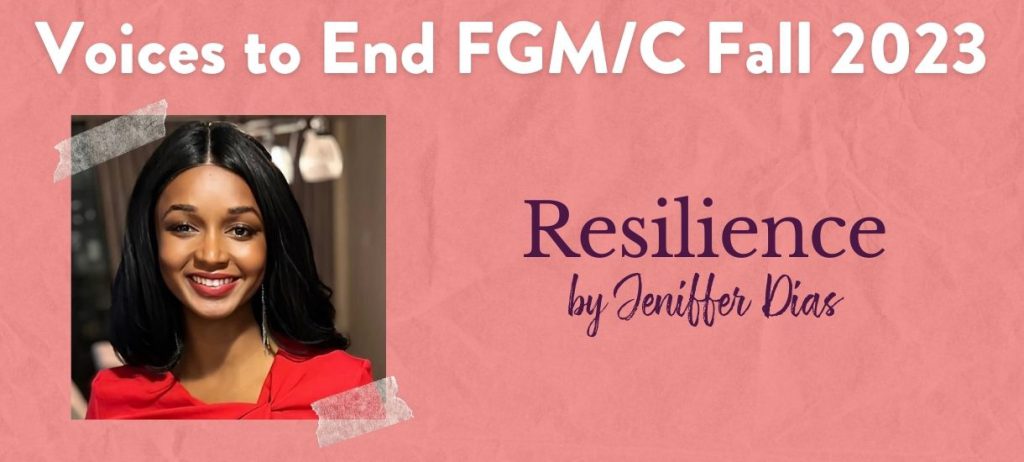
By Jeniffer Dias When I learned I had an opportunity to participate in the Voices to End FGM/C workshop, I first talked with my mentor, Bárbara Oliveira, and told her that I would like to talk about myself. She told me: “This is the moment to remove your ‘mask’ and talk about you, about who you are, and how strong you have been with being alone all your life. And how you protected yourself from being afraid, from being rejected, or from people trying to do what your father did to you. You are far away from that and free.” So I decided to talk; talk about what I did, and still do to protect myself from my past. And I decided to talk about my resilience, and how it has pushed me in my studies, work, and everyday life, to not let others hurt me again. As I usually say, resilience is the ability to accept that life has four seasons, and no matter how difficult and cold winter is, it will end. And then the spring comes, which makes me forget all the suffering that the cold caused me. Then I start to contemplate the flowers, the green fields, the birds chirping, and the rebirth of life. For me, resilience is my inner strength, my faith, the engine that exists within me that does not allow me to stop or remain shaken for a long time in the face of complicated situations; in the eyes of others, it would be impossible for me to find a way to survive or get out of it. The decision to talk wasn’t easy, however. Hours before the first virtual meeting, I was so nervous. I did a lot of things to distract myself because my mind just didn’t want to accept having to talk about my terrible past. I was also worried because the last time I opened up to people about myself, they started treating me differently. So when I started talking I was afraid, but when the meeting finished I felt at peace with myself. I learned a lot during my workshop experience, especially about how powerful women can be stronger together. I also learned that, in working together, our voices can have an impact, improving and changing others’ lives. I felt welcomed and part of the group; everybody treated me very well. I felt love, peace, at home, and all these things helped me to create my story. I am proud of my ability to use the bad things that I had to live with during my childhood (psychological, emotional aggression, humiliation, and abandonment), and transform them into love, affection, and care for others. Creating my story was like officially removing any relationship from being afraid of being rejected. It was like a shout of freedom. I would like my story to have a positive impact. I want my story to inspire others to share the message that everything is possible when you believe in yourself. Regardless of what others say or do to stop your dreams, you can accomplish them. My goals are to be an ambassador at the United Nations, and to work with children’s rights, to protect them against physical and emotional violence. I also want to have a family, to travel, and to be happy. I believe I can accomplish these goals with determination and Resilience. [youtube url=”https://www.youtube.com/watch?v=DPZFTU9Lzto”] Jeniffer Dias, is Portuguese born in Guinea-Bissau. Jeniffer graduated from Universidade Nova de Lisboa, where she studied Political Science and International Relations. She has a strong comprehensive view of diplomacy, international relations, and human rights. Currently, she is carrying out research for her Master’s degree in International Relations with a focus on Child Marriage.
I Didn’t Dare Ask
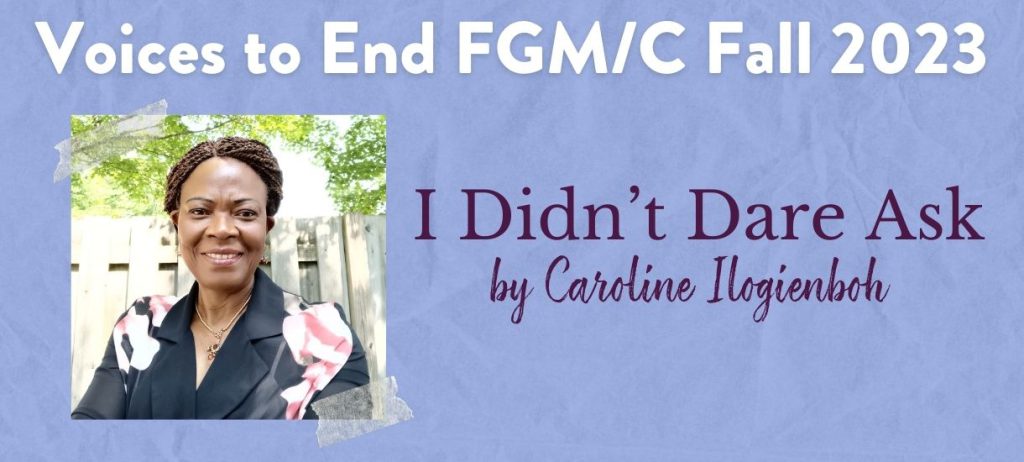
Why did you want to attend the workshop and share your story? I attended the workshop to learn about digital storytelling as another medium of communication in my advocacy work to stop female genital mutilation/cutting (FGM/C). What story did you choose to tell and create into a digital story? I shared the story of the unintended consequences of my cut. After the procedure, I was victimized in school. My peers mocked, despised, and isolated me; I was a loner thereafter. I lost my essence in an age when most youth are filled with exploratory exuberance. What have you learned or most enjoyed during the workshop and by meeting others who shared their stories? Hearing stories from others was an eye-opener. At the workshop, I became more aware that FGM/C can be like secondhand smoking: the procedure can affect those who themselves did not undergo the surgery. I found out that the ripple effect can be as devastating as the cut. Meeting others at the workshop made me feel a kinship with those affected directly or indirectly. Our experiences left us with a long-lasting bond. What kind of impact would you like your story to have? When one part of the body suffers, the whole body suffers. I want people to know that FGM/C can damage an individual’s self-worth, which can become the root cause of other behavioral or mental health issues. Is there anything in your digital story that you would like to share? The story is a plea to practicing communities, to convince them that the cost of the practice, imposed on the society, far outweighs the traditional beliefs driving it. It is my hope that silence will be broken, and people will be motivated to engage in an intellectual conversation that could demystify this traditional belief, with an aim to abolish it. [youtube url=”https://www.youtube.com/watch?v=TbmLtZ6ep6g”] Pidgin version: [youtube url=”https://youtu.be/MG5ZwPGoVFw?si=3IPaMuclLNxcAPP8″] Nigerian-born Caroline Ilogienboh retired from the Justice System in New Jersey, USA. She has written several books. Her award-winning book, “Saving Bekyah” is focused on female circumcision and its effects on women and society. The sequel, “The Greatest Hijack,” is on the Author’s Favorite list. She is currently working on the last of the trilogy, “The Hijacker Strikes Back.” When she’s not writing, Caroline spends time gardening or with her grandchildren.
My experience learning about Kukeketwa (FGC)
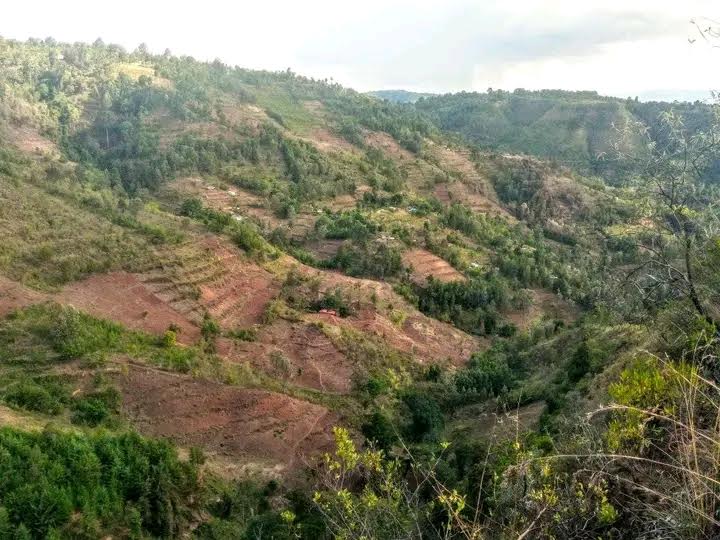
By Cecilia Mwakenya Trigger warning: this article contains graphic descriptions of female genital cutting (FGC). I was born and raised in Chachewa, a small village in Taita Taveta County, Kenya. Taita Taveta County is located approximately 360 kilometers from Nairobi, Kenya’s capital city. The Taita and Taveta communities are the most populous ethnic groups in the county, and I am a part of the Taita community. Growing up in Taita Taveta was an adventure for me because of the serene environment, being surrounded by the Tsavo national park which is a major tourism site in Kenya. Waking up every day to different wild animals and the mountains filled me with such an amazing feeling. It also helped me learn about my culture and the challenges that women and girls face in my community. This included the inability for some girls to afford sanitary towels, and in some homes, frequent violence directed towards women. When I was 13 years old, studying as an eighth grader in primary school, I met a friend of mine whom I will name Tatu for the purposes of this publication. Tatu was a cheerful and bubbly girl who shared funny jokes with us at school. Even when we weren’t in the mood for jokes, she would make us happy and soon we would be smiling like her. Behind her smiles, however, were tears, loneliness, and hidden scars. Like myself, Tatu is a native of Taita Taveta County. Unlike myself, she was subjected to FGC when she was only nine years old. As the youngest of six siblings, with four older sisters, Tatu knew to expect what her female relatives called Kukeketwa, also known as FGC. However, she was not prepared for the experience that would shape her to this day, which she told me about. “It all began when my mother began preparing me for a ‘ceremony’ that was to take place during the school holidays. I was in fourth grade and had no idea what the ceremony was about. As the days passed, my elder sisters began telling me about Kukeketwa and how they, too, had been cut. They said it was a transition from childhood to adulthood. I remember that fateful day, when they took me to a secluded dark hut where the whole process was going to take place. I was scared and started crying out loud. There was this woman popularly known as ‘Koko’, plus two other women including my mother. The other woman put a hand on my mouth, and the others tied my legs to the sides, and Koko took a sharp razor and cut my private part. I was crying and I looked at my private parts, and there was blood everywhere, splashing. Immediately they started singing and told me I am now a complete woman. When I reached home I found my other family members celebrating and singing songs of praises, because I had officially become one of them. It took me three weeks before I healed, but I never remained the same again.” I was so traumatized listening to her story. I did not know behind the exterior of the jovial Tatu, there were scars that will never heal. I was one of the lucky girls because my parents were educated about the harms of this practice, and even with the pressure around the community, they never allowed me to be cut. They were so protective of me, and that is something I am grateful for. In learning from Tatu about the harms of FGC, and living with the privilege of my own exemption from the practice, I grew up with the passion of wanting to work to end FGC. My work at Sahiyo is a part of this, because I believe it is possible to prevent FGC. I want to ensure no other young girls like Tatu will have to hide their pain deeply behind a smile.
The urgency of climate change: Reflecting on my conversation with activist Domtila Chesang
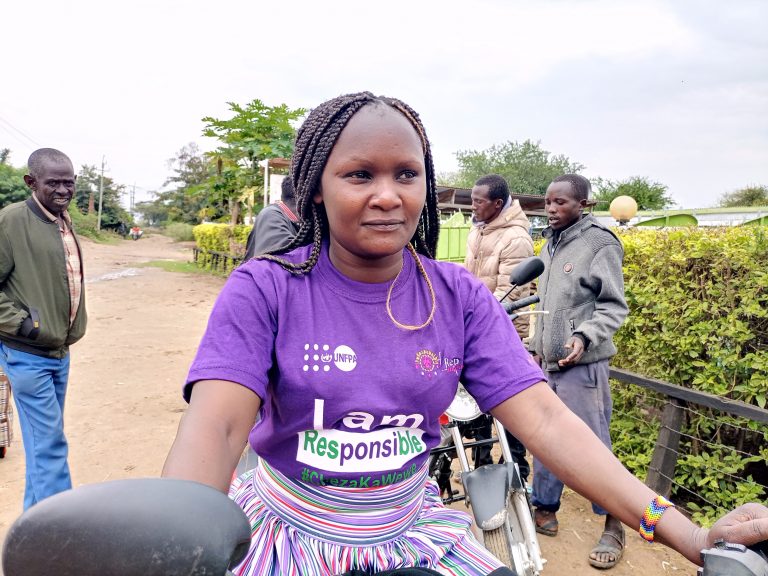
by Urvashi Sharma On a foggy day in October, I had the pleasure of speaking with Domtila Chesang, an inspired activist against female genital mutilation/cutting (FGM/C) in Kenya, and more recently a panellist on The Global Platform for Action to End FGM/C’s Climate Change and FGC webinar, to learn about her work and gain a better understanding of how climate change is impacting FGM/C. Though Domtila is not a survivor, her community is one that practices FGM/C: “I grew up in a village where everybody, all the older members of my family, the female members, had undergone FGM.” After a turn of fate allowed Domtila to witness her cousin being cut, she decided that she would not be cut. “I’m telling you one of the reasons why FGM is still happening in some parts of the communities is because of the celebration. It is a huge ceremony…There are dances. There’s singing. It’s like a one- or two-week celebration. That is not at the moment, because now it is against the law The prohibition of Female Genital Mutilation Act 2011… Nobody knows about the actual cutting and the pain and, of course, the suffering that comes after that.” Seeing this damage changed her perception of FGM/C. Luckily, her mother did not pressure her to undergo the practice. “Apart from one of my younger sisters going through it, none of the other girls from my family went through it after myself. So I became the first girl in my village to say I’m not going to be cut.” Over the years Domtila became more and more involved in the work to end FGM/C. “I got involved [in campaigning against FGM] after I went to high school because I wanted to protect more girls… By the time I was going to the university, I was already taking part in mentorships programs, and working with a group of women who had also decided to campaign against FGM… When I left university, I went straight to campaigning.” It wasn’t until I spoke with Domtila that I understood the urgent intersections of FGM/C with climate change: climate change is forcing communities to further invest in this harmful practice for their survival. “Climate change has really pushed people to the limit, beyond their limit, because… we continue to experience the worst impact of climate change, which is now forcing families to resort to the last solution to survive… We are pastoralists… So we entirely rely on livestock for survival… And now that the land has been degraded, now that there is no pasture, now that there’s no water, it’s becoming very, very scarce, and communities have been displaced.” Because FGM/C “is associated with a rite of passage… child marriage, and… acquisition of wealth,” there is a direct link to climate change. From this displacement and loss of sustenance comes the pressure on young girls to undergo FGM/C: “Girls are now at the centre of saving their families… It has become the only commodity apart from their livestock, because girls are not being extinct as livestock is. So the girls’ existence in itself is becoming a threat because right now, it’s becoming a solution to the communities.” Domtila expressed her frustration at the limits of her role in the face of this challenge: “It is really rendering me almost powerless. I cannot feed the community. I cannot provide alternative survival or livelihood to the community.” For me, this raised the question of context when it comes to advocating for values such as autonomy. In situations where survival is on the line, how do we decide who-or what- is more important? When I asked her about the long-term impacts of climate change on FGM/C, she had this to say: “There’s nothing that is being done at the moment. Very little, just a conversation at the global level, that is slightly prevalent at the national level, and there’s nothing at the community level. It is still a theory. And these people are not yet connecting the dots between climate change and all the other impacts. And I am here as a front-line advocate, but I do not really understand the full degree of climate change and how we can mitigate it.” Despite this vast problem and how it impacts her work to end FGM/C, Domtila cannot imagine dedicating her life to any other social issue. “I think everything about my work is valuable and exceptional… What makes me smile all the time is that seeing all these girls shining in their schools and seeing that all these girls have forgotten about FGM.” After our conversation, I was left with a combination of admiration, food for thought, and gratitude for the chance to learn from Domtila. I gained a new appreciation for the role of an activist, re-evaluated my own developing role, and was inspired by Domtila’s fierce promise of protecting the girls in her community. Domtila Chesang has been advocating for girls and women’s rights since 2014 through various initiatives, including working to end female genital mutilation (FGM), child marriage, and other harmful cultural practices. As a full time women’s rights advocate, Domtila founded I_Rep Foundation, a community-based organisation that serves to sensitise her community on the harms and negative implications of the practices by creating awareness and providing platforms at the community levels for learning and dialogues. I _Rep Foundation is currently directly and indirectly providing educational scholarships to close to 100 girls in different schools. Overall, this work has prevented thousands of girls from the cut and supported her community with the capacity to protect their daughters from violence. Domtila with a reformed cutter in Otiot downing her tools (2021).
Introducing Nala Feminist Collective: African Women and The 10 Demands, including ending female genital cutting
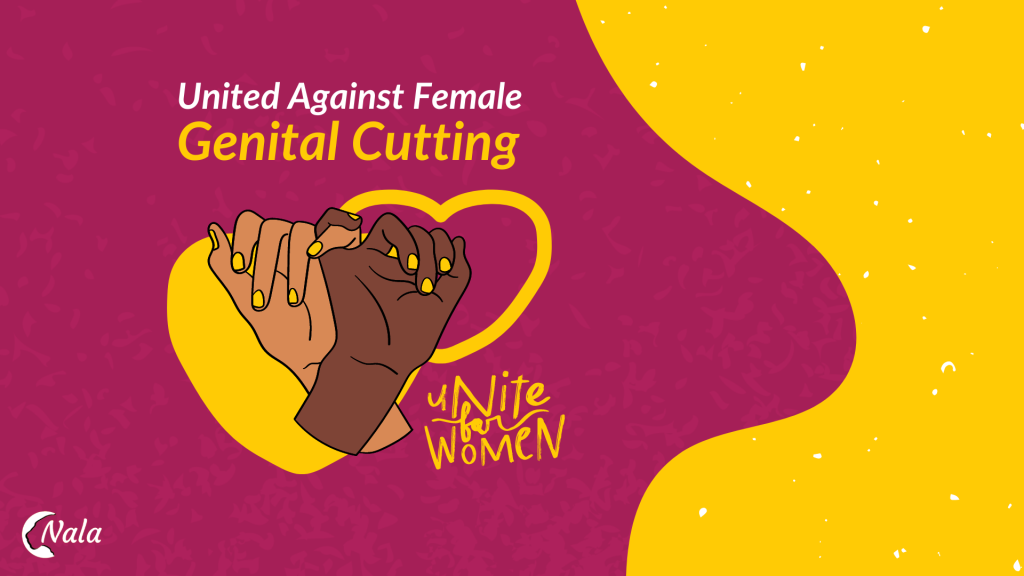
African women continue to struggle to find the right spaces to speak and share the realities of our generation. We do not lack bravery or confidence, but advocacy spaces that would engage our stories with kindness and actual solutions. Our feminist ancestors have taught us that what brings us together is our Pan-African solidarity. As African women, we will not allow anyone to keep us quiet. We know and recognize that the future cannot be just, peaceful and equal if young women and girls remain subject to gender-based violence such as female genital mutilation/cutting (FGM/C), other forms of domestic violence and femicide. Enough is enough. African women want and expect to be freed from the societal misconceptions which fuel the prevalence of FGM/C. It was groundbreaking to bring together 1,500 young people from across the continent during five Africa Young women Beijing + 25 virtual regional barazas (or convenings) hosted by the African Union Special Envoy on Youth, Aya Chebbi, in November 2020. The barazas opened up a space for sharing and speaking on the issues that challenge African women’s access and mobility spatially and socially. This was based on the premise that Africa’s women do not need anyone to speak on their behalf. They have voices and demands that must be heard and acted upon with the respect they deserve. The regional consultations culminated in the Africa Young Women Beijing + 25 Manifesto—a revolutionary feminist document that carries 10 bold demands. These are the hopes and aspirations that come to exist against sexist national laws, marginalization, and the lack of economic justice. As expressed by Africa’s young women, FGM/C remains a tool used to oppress their bodies—as an act of gender-based violence which many women have been forced to remain silent about for decades. Unlike other spaces, the manifesto was not built upon the problematic framing which discusses women’s issues without giving them agency. Instead, it was created through their inputs, generous sharing, radical honesty and listening. What about the other demands? FGM/C interlinkage with other forms of inequalities must be recognized. Each of the Manifesto’s 10 Demands provides an important roadmap to re-affirm that liberation pathways for young women are multi-layered and include demanding the provision of legal, physical and psychological support, shelters and specialist services to women subjected to all forms of violence, to demanding the removal of taxation on menstrual products, enforcement of progressive period policies in all workplaces, and the provision of free sanitary pads and sanitation in all schools. African women and the 10 demands: Economic Justice The Criminalization of Gender-Based Violence The End of Gender-Based Discrimination Access to Justice and Protection Sexual and Reproductive Health and Rights Mental Health and Well-Being Inclusive, Equitable and Quality Education Digital Justice Silencing the Guns Intergenerational co-leadership What binds the manifesto together is an equitable desire to center women’s voices within policy and decision making spaces in which they are absent— an absence that can be deemed violent. These are spaces in which African women are being spoken for, without inclusion. The Generation Equality Forum in Paris provides us, as the Nala Feminist Collective, with a unique opportunity to advocate for the implementation of these 10 demands. We are powered by African women’s words with a document that unites our voices, across urban and rural, online and offline spaces. Our Nala Council is made of 17 feminists with a mission to foster, enable and mobilize young women from Africa and the diaspora, bridging the gap between policy and implementation, intergovernmental and grassroots organizations, as well as generational spaces. Together—not without Africa’s young women. Join our advocacy. We have launched our 10,000 Signature Campaign. We need your support. The fight cannot be solo. Lend your voice to African young women and sign the Manifesto.
Orchid Project releases report detailing the pandemic’s impact on female genital cutting
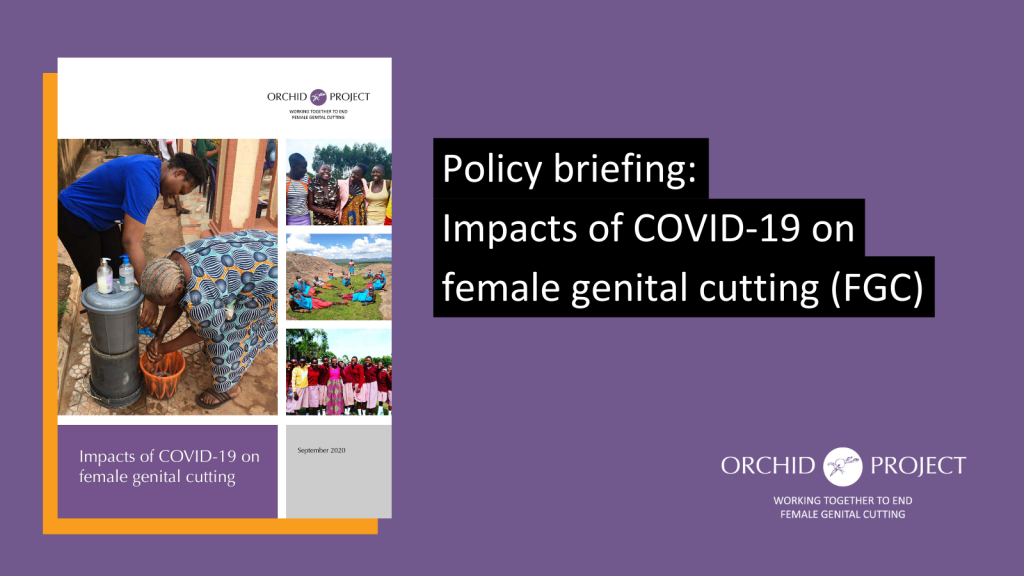
By Hunter Kessous Reports of an increasing rate of female genital cutting (FGC) began early in the pandemic. We are now nine months into the lockdowns and school closures, which have propagated the cutting of young girls. In response, the Orchid Project, decided to further investigate the impact of COVID-19 on the practice of FGC and the movement to end it. The Orchid Project is a nongovernmental organization based in the United Kingdom advocating for the end of FGC globally. Throughout the summer, various grassroots organizations and non-governmental organizations have hosted webinars elucidating the effects of COVID-19 on specific organizations. Sahiyo has shared blog posts reflecting on some of these webinars, which have focused on work in Nigeria and Kenya. There are some key pieces of information shared between these webinars and the Orchid Project’s reports. For example, COVID-19 induced lockdowns and school closures are creating opportunities for FGC to be performed undetected. When girls stay home, they are automatically at a greater risk of undergoing FGC. Furthermore, safe spaces, such as shelters and mental health services, have been closed down. Even medical attention is difficult for FGC survivors to receive, as resources have mainly been diverted to the pandemic. Lack of essential health services and safe spaces for girls and women is a serious concern. According to the report, “Resourcing and programming to end the practice in Asia are extremely limited, so the impact of the COVID-19 pandemic on activities to end FGC have been less significant than in West and East Africa.” The report gives an alarming account of how economic hardship caused by the pandemic has also led to an increase in FGC. In some communities, girls who have been cut are often seen as more marriageable and receive higher bride prices. The bride prices can then be exchanged for food and essential supplies, which has motivated families to cut their girls in this time of extreme economic hardship. Another economic factor involves former cutters who have been returning to the practice, in need of the compensation it will provide. In addition to affecting the practice of FGC, there have also been drastic effects on the movement to end FGC. Nearly all of the groups that were interviewed by Orchid Project for the report have experienced severe restrictions on programming due to stay-at-home and distancing orders. Many organizations have responded by shifting their programming to virtual and media-based formats. However, this is not without its own challenges. Unequal access to technology and internet, along with the often high prices of radio and television communication, have been major obstacles to continuing community dialogues about FGC. The greatest need that the grassroots organizations are currently facing is urgent, flexible emergency funding. This is not to say that the grassroots organizations have not adapted to the dilemmas created by COVID-19. There have been many creative approaches to continuing their important work. Some in-person programming has continued with social distancing and the use of personal protective equipment. WhatsApp and social media platforms are being used to share key information, stimulate dialogues, and share podcasts. Hotlines have been created for at-risk girls; and some activists are even housing these girls in their own homes. The movement to end FGC has certainly taken a hit, but it is not without hope, thanks to the ingenuity and dedication of grassroots activists worldwide. Read the full report by the Orchid Project.
How female genital cutting is portrayed in television series
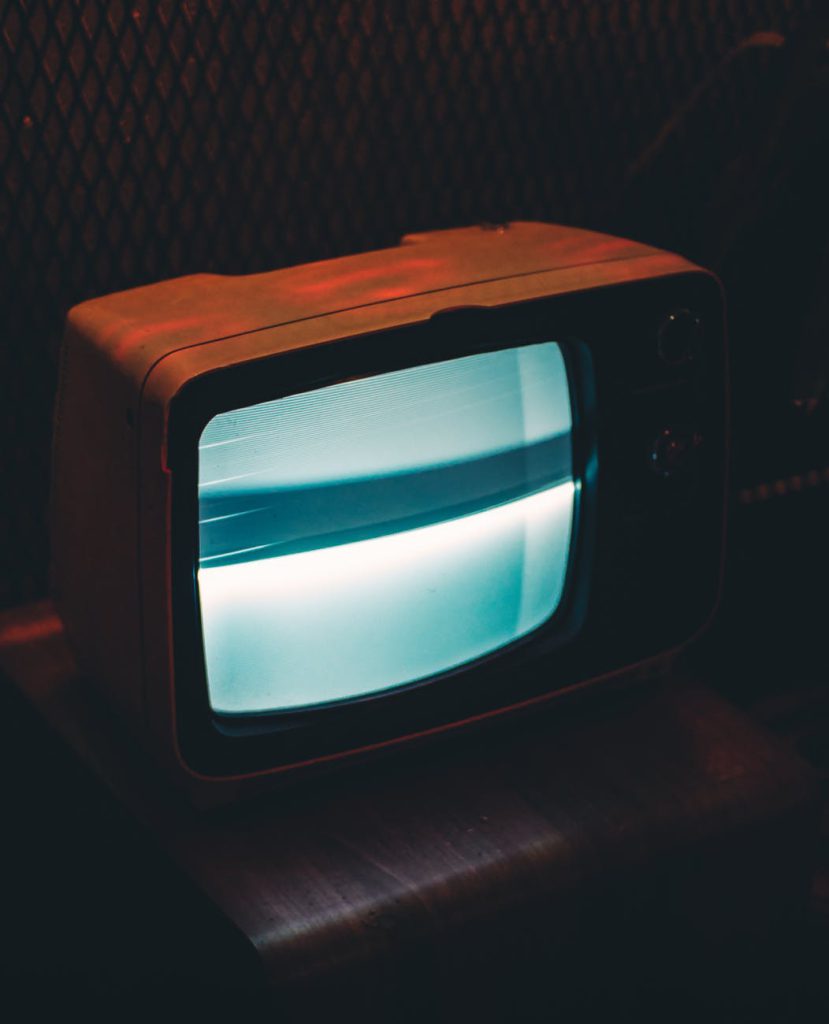
By Hunter Kessous Female genital cutting (FGC) is an international human rights violation and a form of gender-based violence. As the public becomes increasingly aware of this harmful practice, survivors of FGC are being portrayed in media and pop culture. FGC involves the partial or total removal of external female genitalia or other injuries for non-medical reasons. Producers of Orange is the New Black (OITNB), Call the Midwife, and The Good Doctor have incorporated FGC into their storylines. Warning: spoilers ahead! Orange is the New Black Season 7, Episodes 9 and 10 OITNB’s most compelling season brought in Shani, an asylum seeker from Egypt. While in the detention center, she becomes intimate with an inmate, Niky. When their sex life begins to struggle, Shani opens up to Niky about the FGC she underwent at 11 years old. Her mother said she needed to get rid of a bug, a common justification for FGC that girls hear around the world. There are many aspects of Niky’s story that real-life survivors of FGC share. I was very impressed with the writers of OITNB for addressing the struggle with sexuality that FGC survivors face. FGC comes with a multitude of psychological impacts which harm survivors’ emotional and sexual functioning. Yet, too little attention is given to these consequences. Even research is lacking in this area. Niky does an excellent job of portraying how partners of FGC survivors should react. Niky researches alternative ways to make Shani feel good that don’t involve clitoral stimulation. In their next sexual encounter, Niky ensures Shani is relaxed and moves slowly. When pain arises, Niky stops immediately and promises that they will keep communicating until they find what works. The relationship between Niky and Shani is truly heart-warming. The actress who played Shani, Marie-Lou Nahhas, is a Lebanese American anti-FGC activist, who traveled with the UNFPA to meet with FGC survivors in Ethiopia, and uses her social media platforms to share information on FGC. Nahhas recently hosted the launch of Farzana Doctor’s newest novel, Seven, about women’s relationships, marriage, infidelity, religion, tradition, and sensitively exposes the practice of khatna or FGC among the Dawoodi Bohra community. Call the Midwife Season 6, Episode 6Te Call the Midwife painted the story of a pregnant woman, Nadifa, from Somaliland in the 1960s in England. At a young age, she was infibulated, meaning her outer labia were sewn together in order to form a seal, which narrows the vaginal opening. Like Shani, Nadifa thought what had happened to her was typical. The doctor and midwives had never seen FGC before, but handled her case graciously. When Nadifa went into labor, the midwife realized the panic she was experiencing was a result of a flashback to having been cut, and helped calm her. Mental health consequences are another component of FGC that are rarely discussed. Nadifa gave birth en-route to the hospital, and the midwife had to cut her open in the ambulance. The day after her baby was born, Nadifa’s little sister was sent back to Somaliland by her mother’s orders to be cut. The midwives were enraged at this news and asked Nadifa how she could allow her sister to be held down and cut by a man, the same procedure that could have killed her. Nadifa informs the midwives, to their shock, that it is a woman, not a man, who performs FGC. She says her sister must be cut to ensure she is respected, clean, and able to find a good husband. The reasons Nadifa gave for her sister to undergo FGC are common justifications in many communities around the world. The midwives are unable to prevent Nadifa’s sister from leaving, as her boat for Somaliland leaves before they can reach her. The redeeming factor of this sad ending is that Nadifa decides not to allow her own daughter to be cut. The Good Doctor Season 2, Episode 2 In this episode of The Good Doctor, a patient named Asha goes to the emergency room seeking vaginal rejuvenation. She says at the age of two she was tied down and cut. According to a research study on FGC, for survivors who sought reconstructive surgery, repairing the visual stigma of their genitals was a major motivator. Asha, whose real name is Mara, is of African ancestry, but her story highlights that FGC is occurring in the U.S. The surgeons create an elaborate plan to make her an outpatient so she can be home at the end of the school day. The plan goes awry when Mara awakes from surgery in pain. This signals that she has nerves that may be used to reconstruct the clitoris. Her parents and surgeon argue over whether Mara should undergo the reconstructive surgery or have the remaining nerves killed. The safer option would leave Mara permanently unable to experience clitoral stimulation. Mara chooses not to undergo the reconstruction. The surgeon awakes her once more without her parents present and tries to convince her to undergo the clitoral reconstruction. The surgeon goes ahead and performs the clitoral reconstruction without Mara’s consent. When Mara wakes up and realizes what happened, she thanks the surgeon. For the second time in her life, Mara’s body was altered without her consent. For many FGC survivors, this would be psychologically distressing. Another major flaw we see in this episode, is that the doctor repeatedly calls FGC “butchering.” This language is very harmful and is demeaning to communities that practice FGC. This word choice is alienating, and can promote discrimination and reinforce stereotypes. Language such as this is counterproductive to the movement to abandon FGC. Overall, I was very impressed with the portrayal of FGC in these TV shows. FGC is a complex issue, and I was happy to see facets such as sexuality, mental health, culture and treatment being addressed. When I embarked on this project, I was preparing myself for stereotypes and myths. Fortunately, this wasn’t the case. In fact, some common misconceptions were addressed. I believe the media
